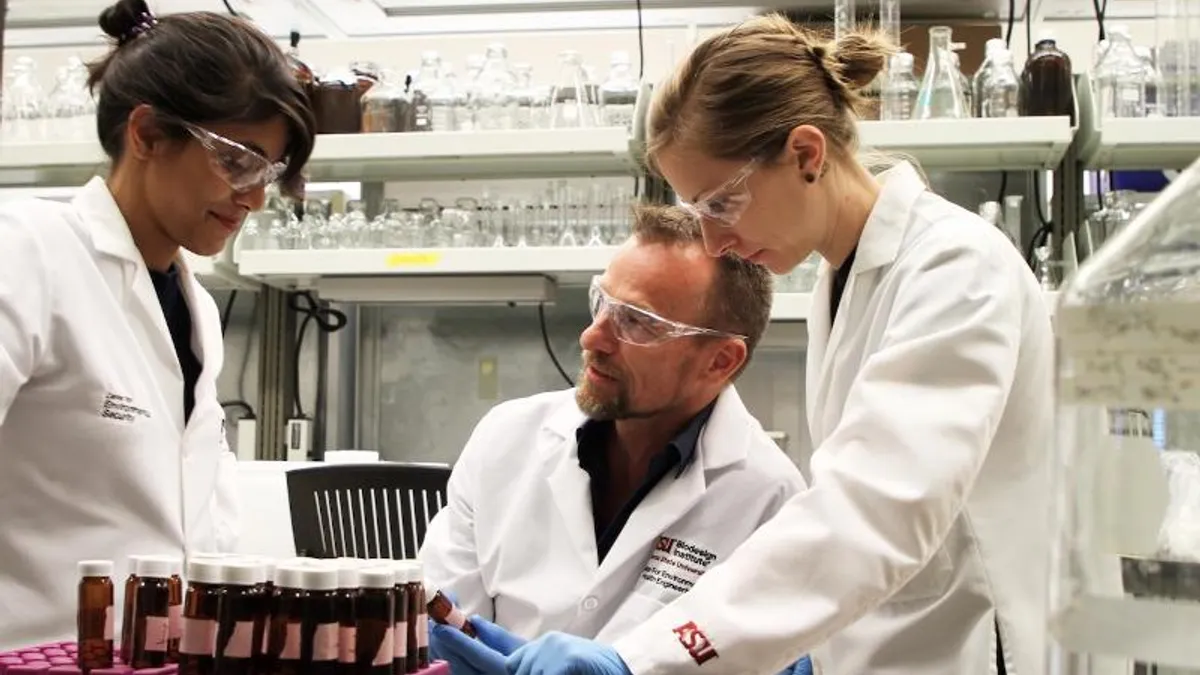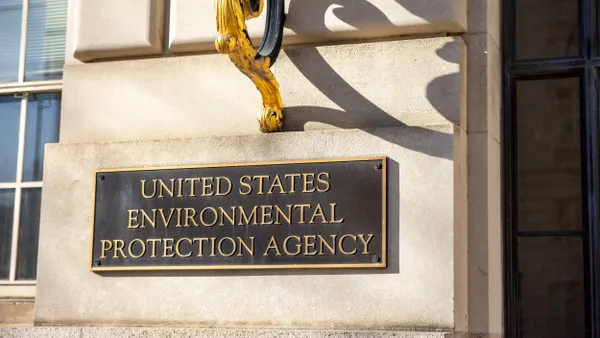In the Center for Environmental Health Engineering at Arizona State University's Biodesign Institute, researchers are identifying the prevalence of local coronavirus cases by tapping into the dirtiest part of any city: the sewer.
Through a research partnership with the City of Tempe, AZ, Professor Rolf Halden and his team of researchers are using years-old technology to better understand the new coronavirus. Through wastewater testing, the team can identify regional levels of SARS-CoV-2 — the virus that causes COVID-19 — and identify viral hotspots in the city. That data can then be used to implement effective policies and measures to improve public health.
Halden, who's been studying wastewater epidemiology for over a decade and wrote a book on the topic, said the cheap, quick testing is a powerful way to track and prevent the current spread of coronavirus.
"We always learn after the fact," Halden told Smart Cities Dive when describing the need for more preventative testing. "The sooner we learn about the presence of the virus in the city, the better off we are."
A history of sewage addiction
Halden said his team was among the first in the world to really push on the theory that wastewater carries an abundance of untapped information. For years, the researchers have published work identifying various chemical contamination in wastewater to better understand public exposure.
"We've called ourselves 'sewer addicts' for a long time," Halden said.
In 2017, the team's focus shifted to the devastating opioid epidemic. While the use of illicit drugs is difficult to track due to fears of prosecution and lingering stigmas around addiction, the sewer doesn't lie. Halden and his team monitored wastewater during that epidemic to identify the presence of opioids in the Tempe area and specify if those drugs had been injected/ingested or simply flushed.
"Monitoring sewage for drugs ... serves as the most direct means known for revealing which drugs are being collectively used by a community," an EPA spokesperson told Smart Cities Dive at the time of the epidemic.
The City of Tempe published a public-facing dashboard in 2018 of neighborhood-level drug data and analysis, gleaned by the research team. Tempe was the first city in the world with such a resource, Halden said.
By 2019, the team received a $1.5 million grant from the National Library of Medicine to build out an early-warning system for monitoring wastewater to track the seasonal flu. That system was being used to collect samples by October 2019 — then all efforts were shifted to coronavirus testing.
Catching COVID-19
As cities grapple with this unprecedented health crisis, many are struggling to quickly identify COVID-19 cases before potential transmission of the virus. But in Tempe, the prevalence of coronavirus in all 185,000 city residents can be assessed in a matter of hours through the researchers' wastewater testing.
Even asymptomatic residents that unknowingly have the virus will excrete waste that carries SARS-CoV-2, Halden said, which offers a more comprehensive measure of the virus than the typical testing that only symptomatic carriers seek out.
Using a patented technology, the lab can detect "anywhere between one infected person in 114, to one in 2 million," Halden said. While this is a large range, the results are dependent on specific conditions on the ground, the number of virus particles being shed by individuals, as well as water temperature and the amount of time particles spend in the pipes.
This makes tracking down individual COVID-19 cases tricky, but that's not the intention of the research, Halden said. The wastewater testing "gives information on whole communities," and is a cheap way to do rapid screening for an entire swath of people, he said.
In an effort to mimic its opioid dashboard, the City of Tempe and Biodesign Institute released a COVID-19 data dashboard on Wednesday to illustrate the "24-hour average number of viral genomes per liter of Tempe wastewater." The dashboard includes a map of Tempe sliced into differently sized areas based on the locations of inceptors in the sewer system.
Halden said the data will be quite robust, especially as new samples are tested. Over the next several weeks, his team hopes to see the concentration of particles decline or fall below the detection limit.
Expanding the research
The Center for Environmental Health Engineering isn't the only lab leveraging wastewater testing technology to identify virus particles amid the pandemic. The Massachusetts Institute of Technology is currently conducting similar wastewater tests, as are labs in France, Australia and the Netherlands, the Wall Street Journal reports. Yet Halden is confident more testing can be done — and more lives can be saved as a result.
There are nearly 15,000 wastewater treatment plants in the U.S., reaching nearly three-quarters of the country's population, Halden said. Globally, 105,000 wastewater treatment plants connect approximately 2.1 billion people, he said.
"We can measure the entire 72% of the U.S. population within a couple of weeks, if someone gives us the nod to do so and to send us the samples," Halden said. He went on to say this method of testing would be up to one million times cheaper than testing everyone individually. "If we could just divert 1% of the clinical testing that's ongoing right now to testing wastewater — and the test [kits] are essentially the same — we could very quickly and repeatedly measure billions of people."
Beyond the spread of the core virus, the researchers can also gain further insights on how the pandemic has impacted general health levels. Halden's team submitted a proposal to the National Science Foundation (NSF) at the start of the pandemic, detailing ways they could test everything from the consumption of alcohol, nicotine and caffeine, to stress hormone levels. That proposal won them a $200,000 grant for testing, valid through April 2021.
Until then, Halden encourages cities around the world to reach out to the Biodesign Institute for potential testing opportunities. The Institute formed a startup company, Aquavitas, for communities to send in samples for testing, and a nonprofit, OneWaterOneHealth, to support wastewater testing in underserved, vulnerable U.S. communities.
"We’re in a big pickle, and we have to solve this right now," Halden said. "We hope we can get the momentum going by convincing the sponsors as well as the government that this is the right step forward and that we would like to make a contribution to solving this pandemic."
To keep up with all of our coverage on how the new coronavirus is impacting U.S. cities, visit our daily tracker.











